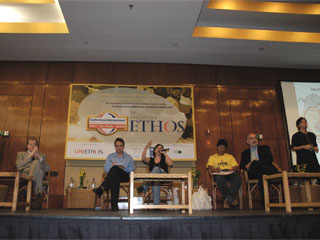Are we selling our fingers to buy rings?
The Amazon is the border of sustainability. The challenge is to generate income without giving up biodiversity
Investing with sustainability in the Amazon is no easy task. That area accounts for over one third of the world flora and fauna species and one fifth of the surface waters in the planet, besides a huge cultural diversity. Just figuring out development considering all the stakeholders is already a source of conflict. One solution, according to Adriana Ramos, coordinator of the Instituto Socioambiental (ISA) and one of the debaters of the roundtable “Companies’ commitments to Amazon’s sustainable development”, is to seek more ethical planning mechanisms and environmental licensing processes. In her opinion, legitimate and legal agreements will support sustainable development of the region in the near future.
According to the executive secretary of the Ministry of Environment (MMA), João Paulo Capobianco, when considering the diagnosis of the Amazon, we tend to underestimate its problems. In other words, the environmental debate in
André Baniwa; vice president of the Federação de Organizações Indígenas do Rio Negro (Foirn), said that the Baniwa Indians gave up doing land management the way their grandparents did, which conserved land for future generations. This is because only some species are valued. “Everyone must change attitude before the forest is over,” he said.
According to Franklin Feder, president of Alcoa Latin America, his company – world leader in the production of aluminum – faces a major challenge: a large scale bauxite mining project in Juruti, in the West of the state of Pará. He believes one of the premises is coupling growth with sustainability. “I think this is feasible, but there is a great challenge between believing and doing.” The arrival of an enterprise like this in a town with a low HDI (0.63), per capita income below R$ 54.00/month, and a population between 35 and 40 thousand people certainly makes a significant impact. Alcoa’s intention, according to Feder, is to integrate with and learn from the community. The exploitation of this mineral wealth will continue for several generations. Success should go beyond the economic side. The focus should be on making the town sustainable after the 50 or, maybe, 100 years of company presence in the area.” According to the president of Alcoa, “70% of the accumulated production of aluminum is still being used, for example, through can recycling. The chain starts with bauxite, but ends with recycled aluminum.” Feder believes the company must be responsible and use as few natural products as possible. “Alcoa is not perfect, but one of our alternatives to conserve the environment is doing research to reduce the use of bauxite and the use of energy to make aluminum.”
Adriana Ramos, of ISA, believes that, if there are complaints from some of the stakeholders of this project despite the three public hearings held, it means there are adjustments to be made. “The company needs to acknowledge its role, instead of waiting for answers.”
The theme is complex and raises doubts: is it possible to grow soybeans, raise cattle, and still keep the forest there? The Brazilian forest legislation, according to Adriana Ramos, believes so, provided we act rationally, allowing space for cattle raising, soybeans, and forest reserves, but not only for sustainable management and logging or raw material extraction. Adalberto Veríssimo, founder of Imazon, shared this opinion and added that it is important to have well defined spaces to be used. “Sustainability is only possible through the conservation of what exists and the exclusive use of deforested areas for agriculture and cattle raising. It is not possible to divide the land equally for different purposes,” said Veríssimo.
Fonte: Instituto Ethos

> Petrobras Watch the Petrobras coverage
© Copyright 2007, Instituto Ethos de Responsabilidade Social Empresarial. Todos os direitos reservados






